Remembering Brian Mulroney: Munk School's Peter Loewen reflects on the former prime minister's legacy
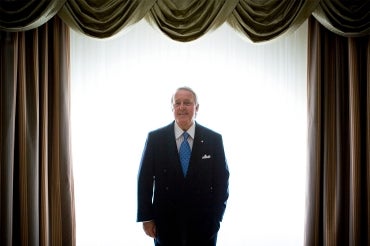
U of T will lower its flags to half-mast in memory of former prime minister Brian Mulroney’s state funeral (photo by Jeff Hutchens/Getty Images)
Published: March 21, 2024
As Canadians prepare for former prime minister Brian Mulroney’s state funeral on March 23, the University of Toronto is remembering his legacy and will lower flags on all three campuses for the event.
Mulroney, the Conservative leader who served as the country’s 18th prime minister from 1984 to 1993, visited U of T on numerous occasions over the years. That includes the G7 summit in 1988, when he met with U.S. president Ronald Reagan and British prime minister Margaret Thatcher at Hart House alongside other world leaders.
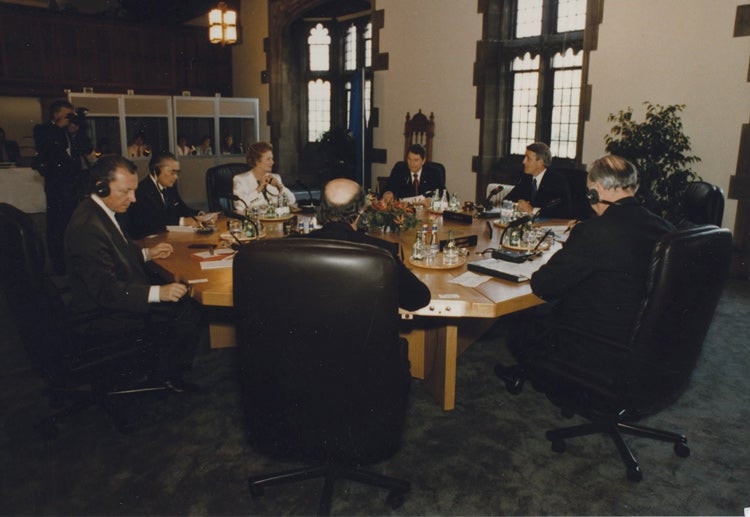
He also made several public appearances at U of T after retiring from politics, including taking part in a conference on antisemitism in 2003 and a conference on diplomacy in the digital age in 2011. More recently, in September 2022, Mulroney visited the Rotman School of Management for an event celebrating the legacy of Michael Wilson, U of T’s 33rd chancellor, who served as finance minister in Mulroney’s government.
A week after the Rotman event, Mulroney visited the Munk School of Global Affairs & Public Policy for a conversation with Professor Peter Loewen, director of the Munk School, during which he reflected on his prime ministerial tenure and discussed Canada’s role in the world and the future of democratic societies.
U of T News spoke with Loewen about Mulroney’s achievements and the legacy of his leadership.
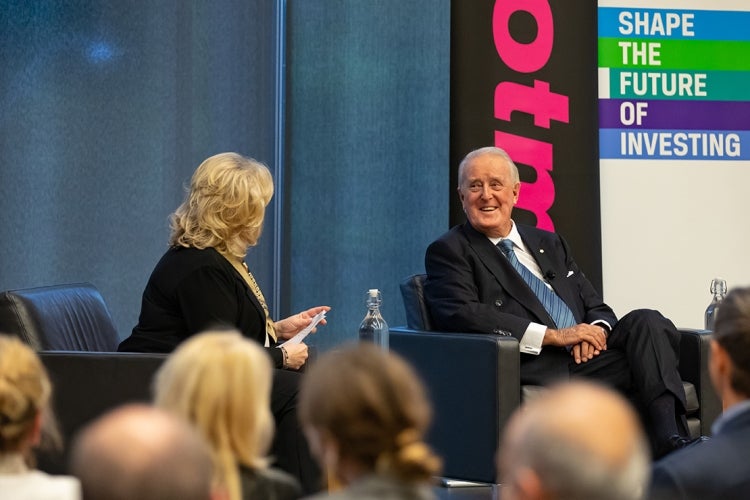
You recently wrote an article in The Conversation in which you described Brian Mulroney’s stance against apartheid in South Africa as one of his biggest achievements. Why?
This was, in Mulroney’s telling, and the telling of many others, one of the greatest achievements of his prime ministership. Brian Mulroney, in concert with Canadian mainstream opinion, was deeply opposed to apartheid. He thought it was an unacceptable form of racial separation within South Africa and was unbecoming of a democracy. That opposition, by the way, went all the way back – several governments – to John Diefenbaker’s Conservative government which opposed the imposition of apartheid when he was prime minister.
Mr. Mulroney became prime minister at a time when the issue was really coming to a head. It was deeply dividing South African society. The imprisonment of Nelson Mandela and many other political prisoners was, by that point, widely recognized internationally as unacceptable. So for Mulroney, it was an opportunity in foreign policy for Canada to play a role in trying to right one of the great wrongs of the world.
He was opposed in that effort, though, by two of his otherwise closest allies and, indeed, closest political friends: Ronald Reagan and Margaret Thatcher, who opposed opposing apartheid ostensibly for anti-communist reasons. They felt that the ANC [African National Congress] was an ally of communists and they still saw themselves locked deeply in the Cold War. So, this made it difficult for Mulroney – and yet he took up the challenge of opposing it. He was joined in that opposition by most Canadians indeed and by other Commonwealth leaders, including Bob Hawke in Australia.
How did Mulroney enlist global organizations in the fight against apartheid?
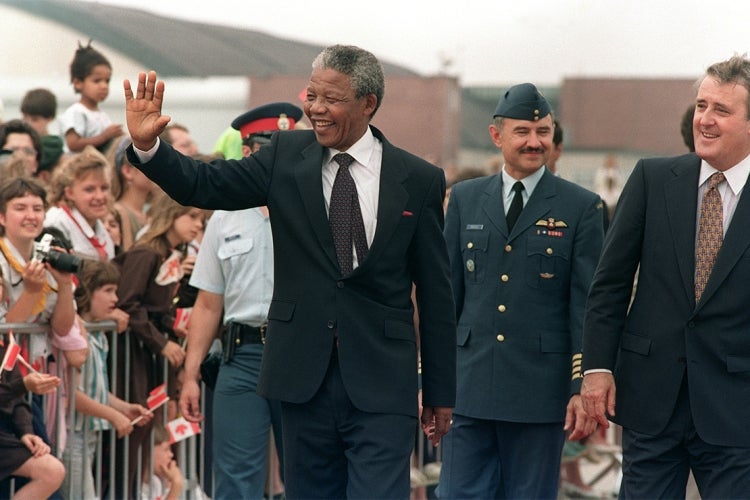
Mulroney’s international leadership was key. In 1987-1988, Mulroney had positioned himself to hold the chairmanship of three different organizations: the Commonwealth, the Francophonie (Organisation internationale de la Francophonie) and the G7. When you hold the chairmanship of those organizations, you’re in a position to set the agenda for the things to be talked about.
It was at that point that he brought the Commonwealth nations together as well as G7 countries – minus the United Kingdom and the United States – to really bring the full pressure of a sanctions regime on the South African government. And this eventually led to much economic difficulty and really squeezed the South Africans so that they had to release Mandela.
[Then-president of South Africa] F.W. De Klerk announced in February 1990 that he would unilaterally release Mandela without conditions. Mandela was released seven days later and one of the first phone calls he made internationally was to Brian Mulroney; indeed, the first parliament he visited after his freedom outside of South Africa was the Canadian Parliament, where he thanked not only Mulroney but all Canadians.
This was a moment of great international leadership by Mr. Mulroney. It’s one in which he marshaled all the support of Canadian public opinion. He often ran against public opinion – in this case he was on the right side of it and he marshaled all that support to this great international action.
What are some other examples of how Mulroney operated on the world stage?
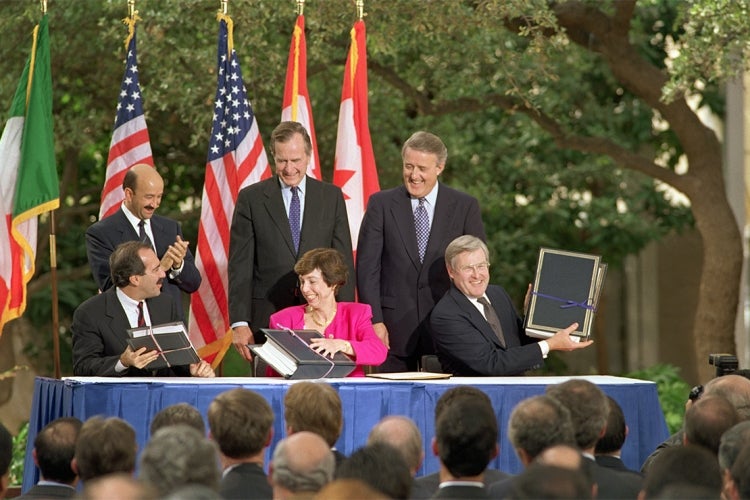
During the first Gulf War – Operation Desert Storm, the American-led mission to push back Saddam Hussein’s Iraq out of Kuwait – Mulroney was very influential in using multilateral relationships to set the terms of engagement for that war. He made it largely possible for other countries like Canada and Australia to have conditions under which they could join that alliance.
Then there’s the other sets of things which weren’t multilateral initially, but bilateral – that is, his agreements with the United States over free trade in 1987 and 1988 that then led to the multilateral NAFTA, which has set the framework for North American trade across all of the Americas. It’s taken a longer time for that vision to be realized, but that template of bilateral and then trilateral trade agreements has really formed the basis for a lot of the trade agreements that Canada now holds throughout the Americas.
How do you reflect on your conversation with Mulroney at the Munk School in 2022?
It was a thrill to have spent the time with him. He’s one of the world’s great storytellers. But woven within those stories are some pretty important political lessons about focusing on the long term and taking on big challenges.
I reflected with [TVO journalist] Steve Paikin – we were chatting after Mulroney’s passing – that I think I may have been the only person to have ever asked Mulroney a question in a public interview that stumped him. I asked him essentially whether there were things he wished he had spent more time on. He couldn’t answer the question.
I don’t know if it was an unfair question, but I think the answer was very telling in that Mr. Mulroney didn’t waste a minute when he was in office. And I think he left with no regrets over all the things that he got done. And that’s a lesson to political leaders today: that you have to really grasp that unfailing minute, and if you don’t make use of all 60 seconds of it, that you will have regrets in your career – but I think Brian Mulroney had none.



